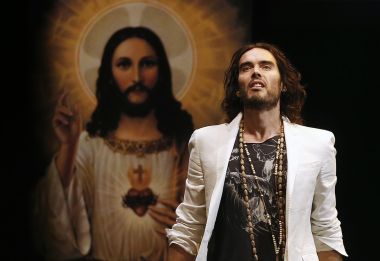Russell Brand says Stephen Fry is wrong... But why do we care so much?

It matters so much more when a celebrity says it. Stephen Fry proved it when he called God stupid, mean-minded and capricious (and let's be honest for a moment, how many of us have had to look that word up?). In the last few days, around 4.6 million response articles have been written, mainly by concerned Christians who wanted to put the nation's favourite anti-theist right. The first of those – published on this site by Krish Kandiah – was an excellent apologetic response to Fry. Not only has it been phenomenally popular, shared around the world on social media, but it's also spawned a string of follow up articles, all presenting tangental versions of the same argument.
And after the world had surely begun to grow weary, and had taken in Pete Greig's heartfelt version, and Giles Fraser's typically ballsy riposte, up stepped Russell Brand. The comedian-lothario turned spiritual sage and revolutionary posted a ten minute video on his YouTube channel, in which he enthusiastically defends God against Fry's attack:
Of course, this isn't a strictly Christian apologetic; Brand wouldn't classify himself a Christian, although he's clearly sympathetic to the faith. There's little he says, however, that's in opposition to the Biblical worldview. He says we're all connected and part of something bigger, and he's right; his defence of a creator is first-rate and hugely accessible. We could get caught up in some of the theologically imperfect statements he makes, but we have to remember that he isn't a theologian – or even a Christian. As the nation debates Stephen Fry's views about God and suffering around the metaphorical water-cooler, I think we should affirm Brand's contribution to the discussion. There's so much good in what he says, and he's brought some celebrity balance to the argument.
One of the best things about Brand's approach is its warmth – both to Fry and the viewer. He's not angry (perhaps he read Krish's piece), and he takes time to talk fondly about the man with whom he disagrees. But he remains determined to offer a strong and serious rebuttal; to explain his strong belief in God as passionately as Fry exercised his dissent.
And of course, just like Fry's original comments, and just like the responses that followed, Brand's video has quickly gone viral. People are already writing response articles to it, for pity's sake.
So the big question is then: why does this seem to matter to us so much? It all started with one outburst from one man, who has presented nothing that hasn't been grappled with for millennia by atheists, agnostics and Christians alike. Why have rebuttal articles suddenly become better click-bait than those entitled 'The 74 best pictures of vegetables that look like Jesus (you won't believe #34!)'?
We might suggest it's because Fry's words create a great opportunity for the Gospel – that they thrust apologetics into the conversational limelight. We might also point to our desire to defend our God and King, or simply to the fact that Gay Byrne's reaction to the outburst is one of the most uncomfortable things you could ever watch. All of these things are true, but I think there's something else going on. Something a little bit darker and more awkward.
Is it perhaps also true that we're so keen to leap to the defensive – and read well-presented arguments that do just that – because Fry has named a theological elephant in the room? Is it perhaps true that many of us share his discomfort, if not on anything like the same scale, about pain, suffering and how that fits with a loving God?
Could it also be true that we have been so keen to respond because he made these statements as a famous, popular and influential man, and also as a noted intellectual? Are we challenged because just as CS Lewis helps reassure us that the great and the clever can arrive at a theist perspective, it's unsettling to see someone like Fry – who we and our culture so respect – take the opposite view?
Perhaps the real challenge in all of this, then, is that Christians should make sure we invest enough in our own spiritual formation, Biblical literacy and apologetic understanding that we don't become shaken by a strongly presented and culturally significant attack on our faith. And we shouldn't be so invested in our culture that the words of two comedians can seriously cause us to question that faith, one way or the other, simply because of their status.
I want to have a faith that is so rooted that it can't be knocked off course by a YouTube video. I want a faith that can't be deconstructed by Stephen Fry any more than it can be rebuilt by Russell Brand. For me, that's the real challenge of this week's viral phenomena.











